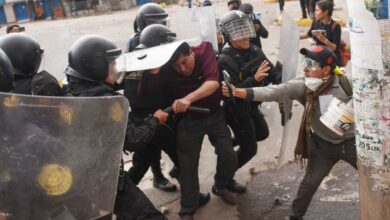Hundreds rallied outside the Alexandria Court of Appeals on Sunday as five labor activists appealed the harshest sentence against striking workers since the time of ousted President Hosni Mubarak’s predecessor, Anwar Sadat.
The court moved to adjourn the case until 21 October.
Ahmed Sadeq, Yosri Maarouf, Ashraf Mahmoud, Mohamed Abdel Moneim, and Essam al-Dein Mabrouk, who are independent organizers at the Alexandria Port Containers Company, were sentenced to three years in prison by the Alexandria Court of Misdemeanors on 23 September. They were found guilty of instigating strikes, sabotage and obstructing operations.
The defendants claim that they went on strike to expose administrative corruption within their company and the Holding Company for Maritime Transport, which is under the authority of the Ministry of Investment. Six hundred workers joined the strike in October 2011.
The ruling against the strikers is reportedly the harshest sentence to be issued in such a case in well over 30 years.
“These are all trumped-up charges leveled against these five workers. And this is the strictest sentence issued by any court against striking workers. We’ve never witnessed such a harsh ruling against workers, not even during the rule of Hosni Mubarak,” says Fatma Ramadan, a board member of the Egyptian Federation of Independent Trade Unions (EFITU).
Ramadan explained that during Mubarak’s rule, workers were often assaulted and arrested at the hands of his security forces. “More often than not, these workers would be released after a few days, or weeks, at most. But now we have workers being sentenced to three years imprisonment; we’ve never seen anything like this,” she says.
According to defendant Yosri Maarouf, “Officials from the ousted regime are responsible for fabricating and filing this case against us.”
Maarouf accuses Mohamed Ibrahim Yousef, the chief of the Maritime Transport holding company, of being the leading figure in fabricating the charges.
“We exposed administrative and financial violations, we exposed corruption involving the renting of port facilities to Chinese and foreign companies,” claims Maarouf. “Officials from both our company and the Holding Company want to silence us. This is why we have been sentenced.”
When asked why the workers did not attend the last court session in which the Alexandria Court of Misdemeanors issued its verdict, Maarouf responds that they were not informed of the trial dates or verdict.
“Our absence from court may have contributed to the harsh sentence,” says Maarouf.
He adds that “the new regime is targeting workers who organize independent unions. They’re targeting our right to strike, and above all, they are targeting workers who speak out against corruption in their workplaces.”
“The ruling authorities are actively seeking to dissolve and weaken the independent trade union movement. The new minister of manpower [the Muslim Brotherhood’s Khaled al-Azhary] has proven to be catastrophic for the labor movement as whole,” Maarouf continues.
“This is the worst performance I’ve seen in the [Ministry of Manpower’s] history. This man [Azhary] has openly stood up against the rights of workers, unionists, and especially independent union organizers.”
Neither Azhary, nor his spokesperson, Alaa Awad, could be reached for comments on this ruling, on allegations against the ministry or on other recent labor crackdowns.
Since early August, when Azhary was sworn-in, security forces have forcefully dispersed a number of protests. Forces attacked unemployed workers demonstrating outside a power plant in Alexandria, shooting one man dead; assaulted unpaid tree-planting workers — including women — during a sit-in at the Ministry of Agriculture; besieged striking bus drivers in their garages across Cairo; assaulted and dispersed a teachers’ sit-in outside Cabinet; beat street vendors across Cairo and confiscated their merchandise; assaulted unemployed disabled persons seeking jobs who were demonstrating outside the presidential palace; assaulted striking microbus drivers, arresting four; and attacked a petroleum workers’ protest in the Red Sea town of Ras Ghareb.
Furthermore, union organizers at the Independent Union of Public Transport Authority Employees and the Independent Union of Flight Attendants were detained and interrogated by prosecutors on charges of instigating strikes.
“Repression against strikes has greatly increased under Morsy and Azhary. Numerous laws and initiatives banning strikes and labor protests have been issued. The new regime is attempting to break the will of striking workers, while the Ministry of Manpower is simultaneously working on weakening and attempting to control the independent union movement,” says Ramadan.
She adds that employers had “punitively sacked” some 300 unionists from their jobs for organizing unions and/or strikes. “The [Ministry of Manpower] has done next to nothing to reinstate these workers.”
However, the Ministry of Manpower has issued a number of statements claiming that it is actively involved in resolving labor conflicts, claiming that it has successfully resolved several such disputes.
On Saturday night, tens of activists protested outside the Journalists Syndicate in solidarity with the five Alexandrian dock workers. Protesters chanted, “We called for bread, freedom and social justice; not the imprisonment of container workers.”
The activists delivered speeches condemning the fact that while courts were indicting workers for exercising their right to strike, at the same time 24 top Mubarak regime officials were acquitted of instigating deadly attacks on protesters in Tahrir Square on 2 February in the Battle of the Camel.
A larger protest was staged in solidarity with the five sentenced workers in the Alexandrian district of Moharam Bey, near the courthouse where they are appealing their case.




